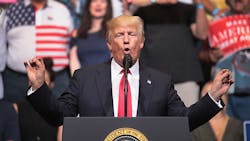U.S. officials have a stern message for their Canadian and Mexican counterparts on the eve of the most important round of NAFTA talks yet: They’re losing patience with the resistance to their proposals to rework the trade accord.
The comments are the latest in a flurry of pronouncements — made both in public and in private — that have come out from all three sides in recent days as they seek to drive negotiations for a new North American Free Trade Agreement in their favor.
From U.S. officials, the message has consistently been that the country will withdraw from NAFTA if there’s no breakthrough on proposals from the Trump administration that are intended to rebalance trade. Canada and Mexico say some of the American ideas would hurt all three nations. The U.S. wants to see serious counteroffers to its demands, such as tightening content requirements for cars, during the round that starts on Sunday, according to two people familiar with the talks who spoke on the condition of anonymity.
U.S. negotiators also want tangible signs of movement from their trading partners on issues such as Mexican labor conditions, which the U.S. says keeps the nation’s wages artificially low, and a “sunset clause” that would cause the agreement to expire in five years unless the countries agree to renew it.
U.S. officials are particularly frustrated with what they see as Canada’s intransigence at the table, according to the two people. While Mexico has shown some flexibility on the U.S. proposals, Canadian officials are more reluctant to give ground, preferring to promote Prime Minister Justin Trudeau’s concept of a “progressive” trade agenda based on improving gender equality and the environment, among other things, one of the people said.
Canadian negotiators have presented “detailed proposals across the board” and there’s been progress on “the vital bread-and-butter trade issues,” Adam Austen, a spokesman for Foreign Minister Chrystia Freeland, said in an emailed response to questions on Friday.
“As is natural during any negotiation, there are issues where we do not all see eye-to-eye,” he said. “We will continue to work hard and negotiate constructively to modernize NAFTA so it is a win-win-win for everyone.”
Lingering Tensions
The tension between the U.S. and its trading partners, especially Canada, sets up a pivotal round of talks in Montreal, which have been extended by three days and now will run through Jan. 29. With the negotiations on home turf, Trudeau’s Liberal government will want to be seen standing up to Canada’s bigger neighbor and its Republican president. For its part, the U.S. won’t be happy with merely procedural discussions on how to address the administration’s toughest demands.
Canada has said it will present new ideas in the upcoming round of talks.
“We’re continuing to work diligently with our Mexican partners and with our American partners to make progress,” Canadian Finance Minister Bill Morneau told reporters Thursday in Toronto. “We’ve said that we have some constructive ideas on how to make a difference in terms of moving forward the NAFTA discussions.”
‘Bad Joke’
President Donald Trump has repeatedly threatened to pull out of the deal, which he blames for America’s $63 billion deficit in goods and services with Mexico. In a tweet Thursday, the president called NAFTA a “bad joke,” and reaffirmed his plan to build a wall with Mexico.
Mexico and Canada are casting the talks in a different light. Mexico’s Ambassador to the U.S. Geronimo Gutierrez said Thursday that differences are narrowing, while last week Canadian officials said the chances are rising that Trump will exit the deal.
At a negotiating round in November in Mexico City, U.S. officials were flabbergasted when Canadian negotiators delivered a presentation suggesting the U.S. proposal on autos is misguided, an approach the U.S. considered to be more of a lecture than a counteroffer, one of the people said. Gutierrez said Thursday Mexico may be able to accept an increase in the regional content requirement for vehicles traded under the deal.
NAFTA requires a vehicle to have a minimum of 62.5% North American content in order to benefit from tariff exemptions for autos assembled and traded in the region. The Trump administration has proposed raising the so-called auto rules of origin requirement to 85% North American content, and add a new 50% U.S. content minimum.
By Andrew Mayeda, Eric Martin and Josh Wingrove.
About the Author
Bloomberg
Licensed content from Bloomberg, copyright 2016.
